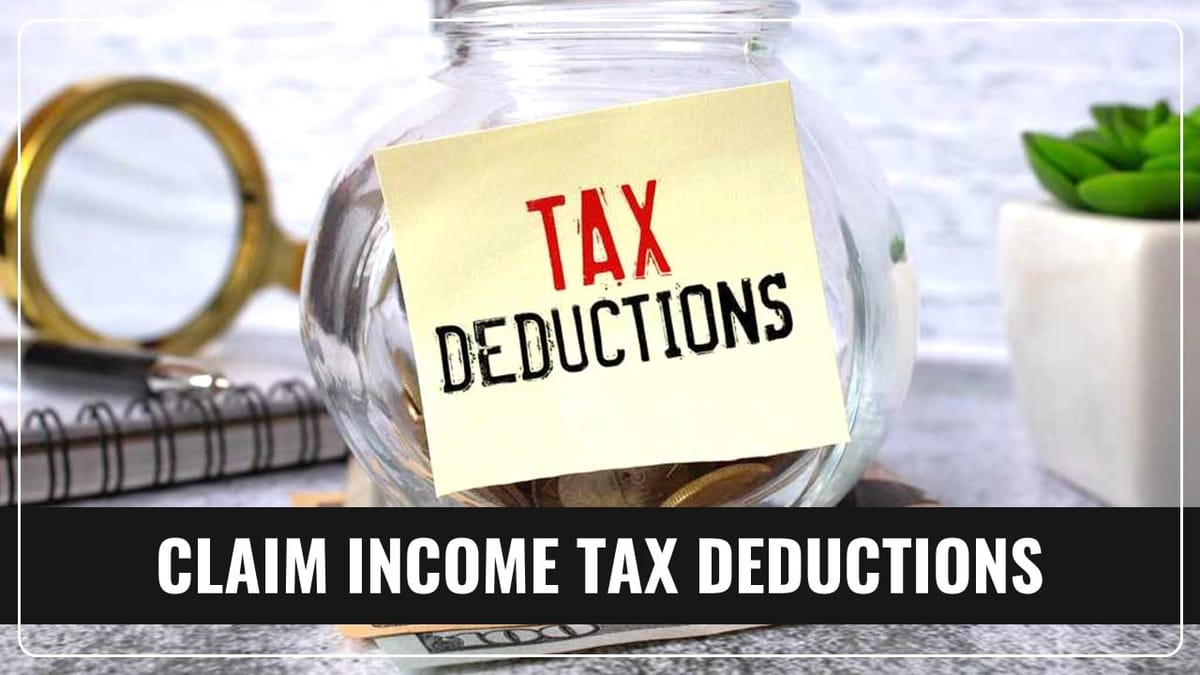Filing an ITR can be a struggle, but don't forget to claim eligible deductions in ITR at the last minute.
Anisha Kumari | Jul 22, 2024 |

How to Save on Taxes: Important Deductions to Claim When Filing ITR
Filing an Income Tax Return (ITR) can be a struggle, but don’t forget to claim eligible deductions in ITR at the last minute despite making the investment or incurring the expenses. However, understanding this key deduction can significantly reduce your tax burden. It is important to remember that if you are unable to use this deduction during the relevant financial year, you may not use it in subsequent years.
Before you begin completing your income tax return, you should make an effort to gather all of the required documentation and data to claim all of these deductions. If you invested in certain schemes like PPF, EPF and NPS and have spent on expenses like premiums of health insurance then you are eligible for some deductions provided in the Income Tax Act 1961. Here are four important deductions to claim for maximum savings and reduce tax liability.
 The Public Provident Fund (PPF) is a widely favoured investment option in India. It offers both safe secure investment with guaranteed returns and various tax benefits under Section 80C of the Income Tax Act. There are no eligibility criteria. Anyone can open a PPF account. You can invest up to Rs.1.5 lakh per year. This invested amount is deductible from your gross income and this reduces your taxable income. Moreover, the interest you have earned and the amount of maturity are free from tax. The PPF has a long tenure of 15 years. Partial withdrawals are permitted after 7th year. By investing in PPF you build a substantial corpus for your future while saving significantly on taxes.
The Public Provident Fund (PPF) is a widely favoured investment option in India. It offers both safe secure investment with guaranteed returns and various tax benefits under Section 80C of the Income Tax Act. There are no eligibility criteria. Anyone can open a PPF account. You can invest up to Rs.1.5 lakh per year. This invested amount is deductible from your gross income and this reduces your taxable income. Moreover, the interest you have earned and the amount of maturity are free from tax. The PPF has a long tenure of 15 years. Partial withdrawals are permitted after 7th year. By investing in PPF you build a substantial corpus for your future while saving significantly on taxes.
 The Employees’ Provident Fund (EPF) is a retirement benefit scheme for salaried employees. The employee’s contribution qualifies for tax deduction under Section 80C. Salaried employees are eligible for this deduction. The 12% of your basic salary and dearness allowance will be given to your EPF account. The employee’s contribution up to Rs.1.5 lakh per year is eligible for deduction under Section 80C. The interest that you will earn on EPF will be also tax-free. EPF can be withdrawn at retirement or under specific conditions. These include unemployment for a specified period. This ensures financial security post-retirement while reducing your taxable income during your working years.
The Employees’ Provident Fund (EPF) is a retirement benefit scheme for salaried employees. The employee’s contribution qualifies for tax deduction under Section 80C. Salaried employees are eligible for this deduction. The 12% of your basic salary and dearness allowance will be given to your EPF account. The employee’s contribution up to Rs.1.5 lakh per year is eligible for deduction under Section 80C. The interest that you will earn on EPF will be also tax-free. EPF can be withdrawn at retirement or under specific conditions. These include unemployment for a specified period. This ensures financial security post-retirement while reducing your taxable income during your working years.
 Equity-Linked Savings Scheme (ELSS) mutual funds provide benefits of both tax savings and the potential for higher returns. Anyone can invest in ELSS with no maximum investment limit. However, only up to Rs.1.5 lakh qualifies for deduction under Section 80C. ELSS has a lock-in period of 3 years. Investments up to Rs.1.5 lakh in ELSS will be deducted from your taxable income. The returns are subject to Long Term Capital Gains (LTCG) tax if they exceed Rs.1 lakh. ELSS investments although subject to market risks. They can provide higher returns compared to other Section 80C options.
Equity-Linked Savings Scheme (ELSS) mutual funds provide benefits of both tax savings and the potential for higher returns. Anyone can invest in ELSS with no maximum investment limit. However, only up to Rs.1.5 lakh qualifies for deduction under Section 80C. ELSS has a lock-in period of 3 years. Investments up to Rs.1.5 lakh in ELSS will be deducted from your taxable income. The returns are subject to Long Term Capital Gains (LTCG) tax if they exceed Rs.1 lakh. ELSS investments although subject to market risks. They can provide higher returns compared to other Section 80C options.
 Health insurance is crucial for managing medical costs. The government incentivizes purchasing health insurance by offering tax perks under Section 80D. Individuals and Hindu Undivided Families (HUFs) can claim this deduction. You can claim up to Rs.25000 for premiums paid for yourself, your spouse and dependent children. An extra amount of Rs.25000 if you will pay for your parent’s health insurance. This increases to Rs.50,000 if your parents are senior citizens. You can also claim for preventive health check-ups up to Rs.5,000. Health insurance premiums reduce taxable income. This cuts down the total amount of taxes owed. Health insurance not only protects against high medical costs but also provides substantial tax savings.
Health insurance is crucial for managing medical costs. The government incentivizes purchasing health insurance by offering tax perks under Section 80D. Individuals and Hindu Undivided Families (HUFs) can claim this deduction. You can claim up to Rs.25000 for premiums paid for yourself, your spouse and dependent children. An extra amount of Rs.25000 if you will pay for your parent’s health insurance. This increases to Rs.50,000 if your parents are senior citizens. You can also claim for preventive health check-ups up to Rs.5,000. Health insurance premiums reduce taxable income. This cuts down the total amount of taxes owed. Health insurance not only protects against high medical costs but also provides substantial tax savings.
By claiming these deductions when filing your ITR. You can significantly reduce your taxable income. This saves you money. Investing in options like PPF, EPF and ELSS along with paying health insurance premiums, secures the future and offers tax benefits. File your ITR accurately to enjoy these benefits.
In case of any Doubt regarding Membership you can mail us at [email protected]
Join Studycafe's WhatsApp Group or Telegram Channel for Latest Updates on Government Job, Sarkari Naukri, Private Jobs, Income Tax, GST, Companies Act, Judgements and CA, CS, ICWA, and MUCH MORE!"